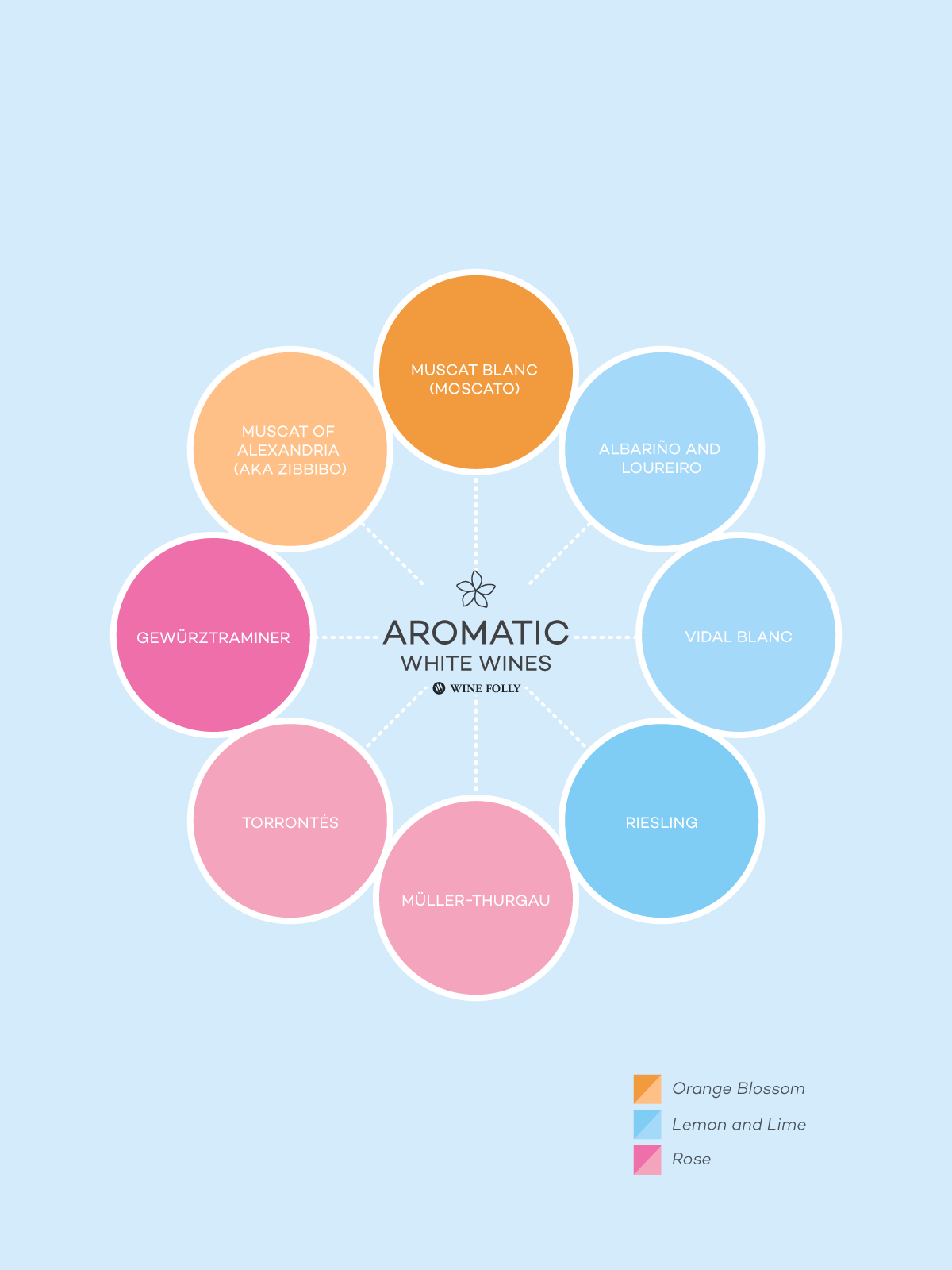The most commonly misused descriptors in wine are "dry" and "sweet." These words are quite literally describing how much residual sugar (RS) remains in the wine after the alcoholic fermentation. The VAST majority of table wine is completely dry.
At least 95% of the wines that you consume regularly are completely dry. Meaning, there is no sugar in them because the wine was "fermented dry." This means that during fermentation, the yeasts metabolized all the grape sugars, effectively converting it all to alcohol.
A wine may be considered "off-dry" or "semi-sweet" based on how much Residual Sugar remains in the wine. The more RS in the wine, the sweeter it is.
Then, how come some of these wines I'm saying are dry, seem sweet when I drink them?
This is part 5 of 5 on our structure series. Structure is made up of S.T.A.A.F.
- Sugar Presence
- Tannins
- Acidity
- Alcohol
- Fruitiness
You can learn more about structure HERE.

https://winefolly.com/deep-dive/what-are-aromatic-white-wines/
Wine terms: Sweet vs. Fruity
Our sense of smell is responsible for ~80% of what we "taste." So you might think a wine is sweet, but in reality it just has lots of fruity, sweet-smelling aromas/flavors. Again, if there is no RS left over in the wine post-fermentation, the wine is dry. So unless you're buying bottom shelf grocery store bottles for the masses, and you're not a German Riesling nerd, virtually all the wine you're drinking is dry.
Aromatic whites like Gewurtztraminer, Muscat, Riesling, Torrontes, Albariño, Muller-Thurgau, etc. are common culprits of wines that many folks think are sweet, but in reality they just tend to have pronounced fruit aromas.
Sweet = presence of sugar in the wine
Fruity = fruit aromas and flavors are the dominant characteristics of the wine
What makes a wine fruity?
The one word answer: CLIMATE.
Although certain grape varieties tend to make fruity wines (see aromatic whites above), at the end of the day, it comes down to climate.
Warmer climates yield grapes that are riper than cooler climates. Riper grapes have higher sugar levels which create wines with fruity characteristics.
A great example of a warm climate producing a fruity wine is California Cabernet Sauvignon. They're known for being fruit-forward, jammy, and having high alcohol content.
A Cabernet Sauvignon from a slightly cooler climate like Bordeaux (Cabernet's motherland) displays more minerality, subtle, nuanced tart fruits, light weight/body, and earthy overtones.
How to pick out a bottle that is or is not fruity?
ABV % is a great place to start. Wines higher in alcohol are more likely to be fruity.
Why?
Riper grapes = more sugar = more alcohol
Riper grapes = more sugar = more fruity aromas/flavors post-fermentation
Certain grape varieties and/or regions tend to make fruitier wines. As we mentioned above, hot climates produce fruity wines because they ripen the grapes so much. Some oenophiles would even argue that warm climates over-ripen the fruit which result in "fruit bombs."
Warm Climate Wine Regions:
- Most of California
- Argentina
- Australia
- Southern Italy
- Greek Islands
- Central & Southern Spain
- Central & Southern Portugal
- Most of South Africa
- Southern France
- Southern Italy
Grape Varieties That Tend to Be Fruity:
- Zinfandel
- Muscat/Moscato
- Riesling
- Gewurtztraminer
- Gamay
- Malbec
- Cabernet Sauvignon
- Merlot
- Shiraz
What Is A Fruity Wine?
A fruity wine smells....FRUITY!
When talking about fruit characteristics, there are descriptors such as...
- under-ripe / tart
- ripe
- over-ripe / jammy
- dried fruit
- stewed fruit
- baked fruit (think of the difference between a fresh apple and apple pie)
So a "fruit bomb" would be a wine that displays too much over-ripe, jammy, baked fruit that dominates the wine without showing any notes of anything but that overpowering fruit.
How much is too much?
This goes back to structure. You want the S.T.A.A.F. to be balanced and in harmony with each other: Sugar Presence, Tannins, Acidity, Alcohol, and Fruitiness.
Does Fruitiness help a wine age?
Yes! Over time the condition of fruity qualities diminish and transform from ripe/overripe/jammy to dried or cooked fruit. If you've ever enjoyed quality aged wine, you may have noticed that the fruity notes have more of a dried or raisinated quality rather than fresh, ripe fruits.
Wines that are actually sweet...
Meaning they have Residual Sugar in them, rather than smelling/tasting fruity. Typically these are true dessert wines like...
- Sauternes
- Tokaji
- Sweet German Rieslings (Beerenauslese, Trockenbeerenauslese)
- Moscato d’Asti
- Ice Wine
- Rutherglen Muscat
- Recioto della Valpolicella
- Vintage Port
- PX Sherry